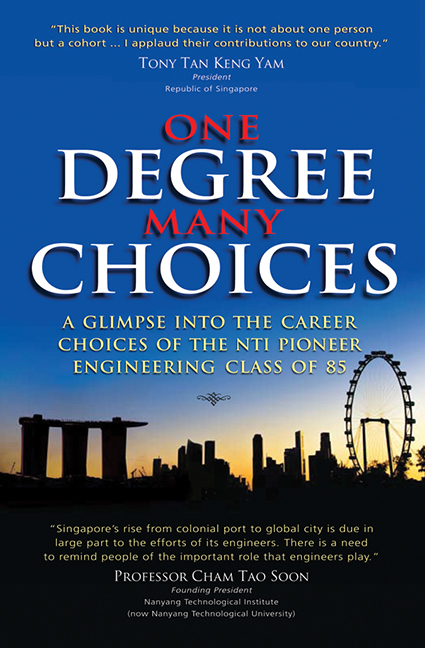 One Degree, Many Choices
One Degree, Many Choices from PART V - EPILOGUE
Published online by Cambridge University Press: 21 October 2015
“As pioneers, we had no precedent and charted our own course. That built character in us.”
— Seow Kim Kheng, EEE PioneerMANY THINGS CAN HAPPEN over 25 years. Hairlines recede, tummies bulge and children grow up. Looking through the prism of time, some pioneers reflect on their NTI education and its impact on their lives. All were glad that they took the plunge to join a new university. Seow Kim Kheng said, “As pioneers, we had no precedent and charted our own course. That built character in us. NTI taught me to keep going when the going gets tough.” Song Siak Keong enjoyed his time in NTI despite the “spartan facilities and flies in the canteens.” Joe Hui learnt how to “make do”, a spirit that saw him through various start-ups.
A common thought is that one might not end up doing what one was trained in. However, that does not negate the value of the training. Alan Lim said, “While I never practised engineering, NTI prepared me well for my career at ExxonMobil.” His engineering basics enabled Henry Tan to pick up new technologies. He was able to move from the aerospace industry to the information technology sector and finally ending in the telecommunications industry. NTI enabled Alfred Tan to build upon his training and go beyond. At the Ministry of Defence, he picked up new skills to design structures to withstand explosions.
NTI taught Tan Lam Seng to attend to details and gave Yeap Khek Teong “strong mental training” to overcome challenges. Eugene Tan is adamant that “only engineering trains one to systematically reduce complex problems to solvable bits”.
Some NTI pioneers singled out the practice-oriented approach for praise. Ho Tian Fui found the in-house practical training valuable. Daniel Tan “appreciates going through the entire construction process from planning to budgeting and execution”. Phuah Soon Ek's industrial attachment enabled him to adapt to fieldwork easily. Chong Wai Swee was able to do his work as a foreman from day one. Chan Kok Jin's industrial attachment stint gained him valuable contacts.
There were grateful words for the founding lecturers. “They came from the industry and imparted useful knowledge, experiences and skills to us,” said Song Siak Keong. Tan Shan Kiat lauded them for helping students apply theory in real life situations.
To save this book to your Kindle, first ensure [email protected] is added to your Approved Personal Document E-mail List under your Personal Document Settings on the Manage Your Content and Devices page of your Amazon account. Then enter the ‘name’ part of your Kindle email address below. Find out more about saving to your Kindle.
Note you can select to save to either the @free.kindle.com or @kindle.com variations. ‘@free.kindle.com’ emails are free but can only be saved to your device when it is connected to wi-fi. ‘@kindle.com’ emails can be delivered even when you are not connected to wi-fi, but note that service fees apply.
Find out more about the Kindle Personal Document Service.
To save content items to your account, please confirm that you agree to abide by our usage policies. If this is the first time you use this feature, you will be asked to authorise Cambridge Core to connect with your account. Find out more about saving content to Dropbox.
To save content items to your account, please confirm that you agree to abide by our usage policies. If this is the first time you use this feature, you will be asked to authorise Cambridge Core to connect with your account. Find out more about saving content to Google Drive.